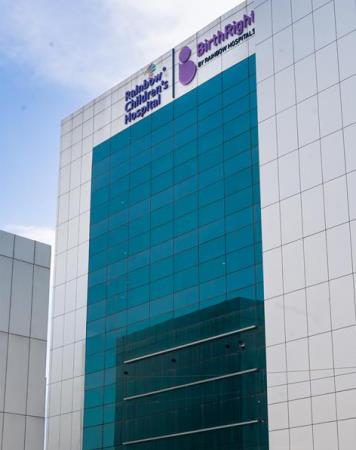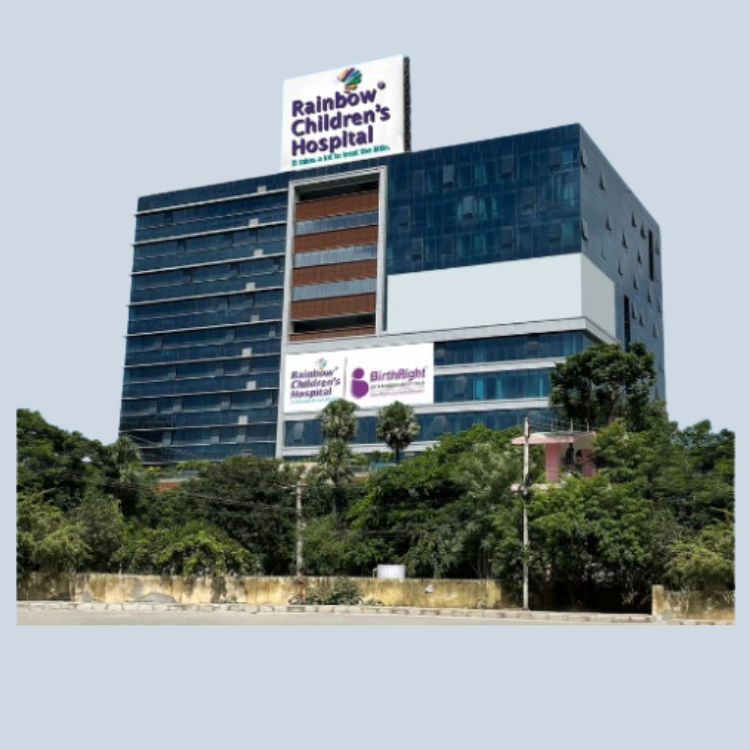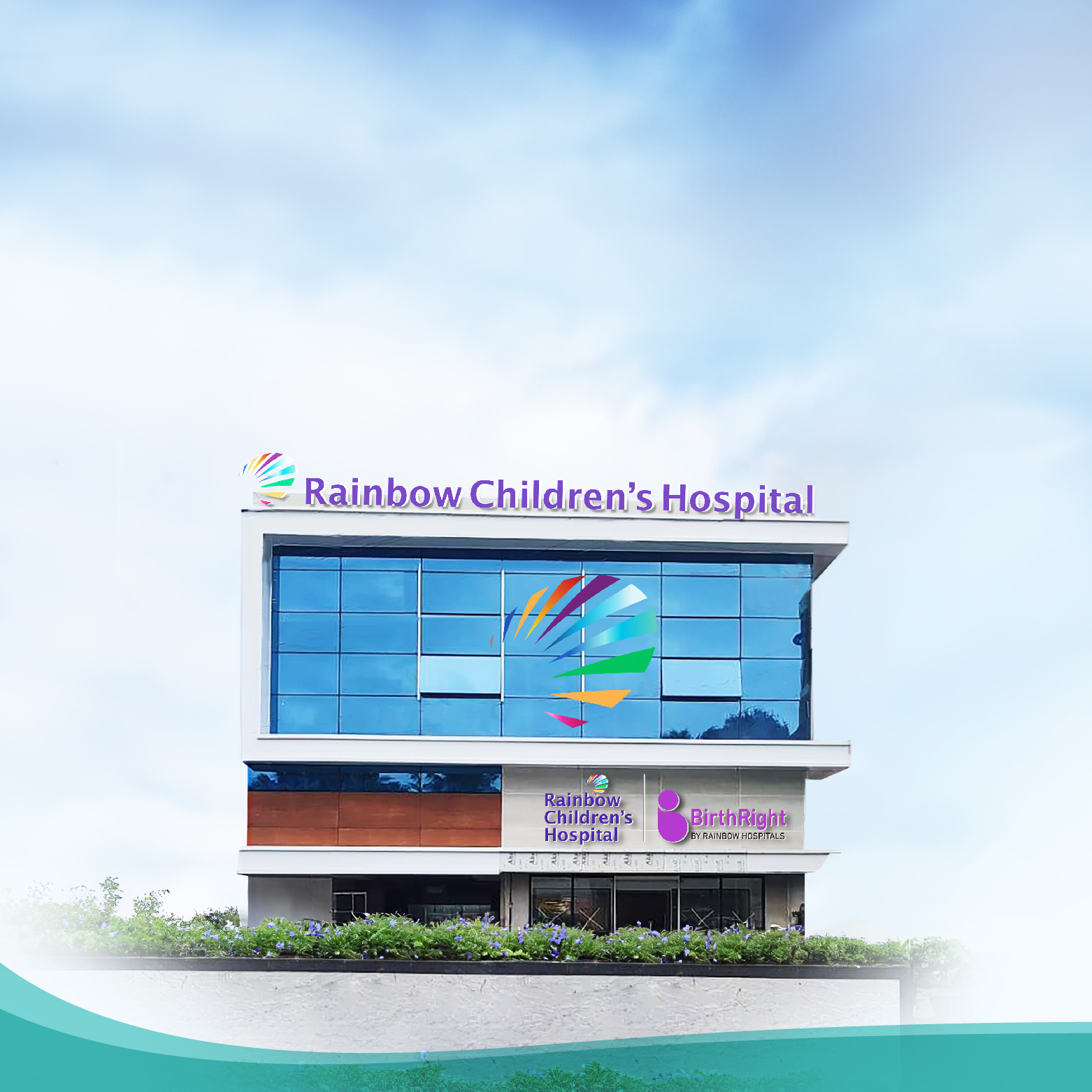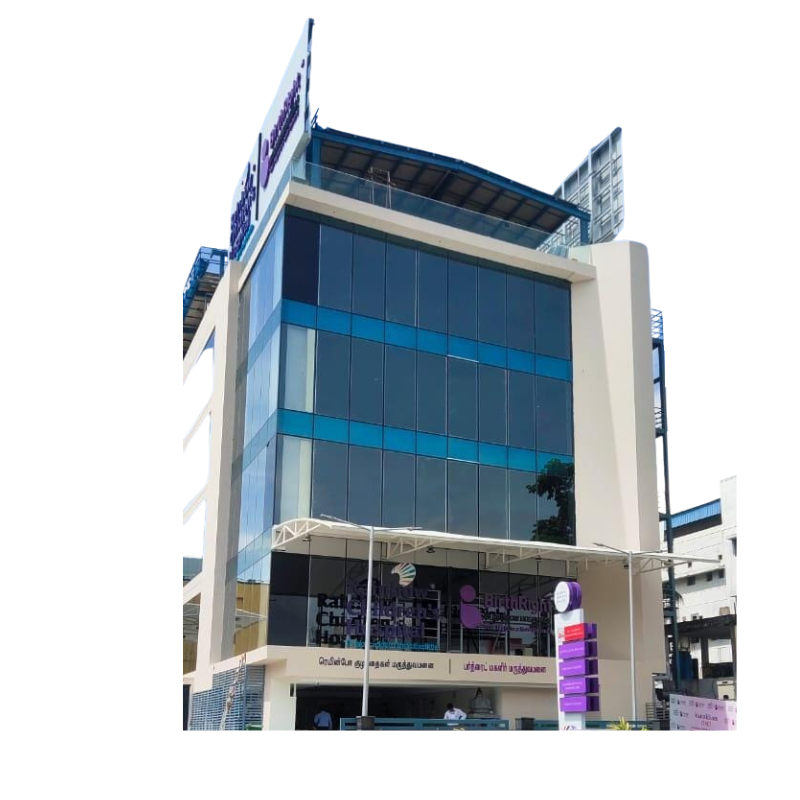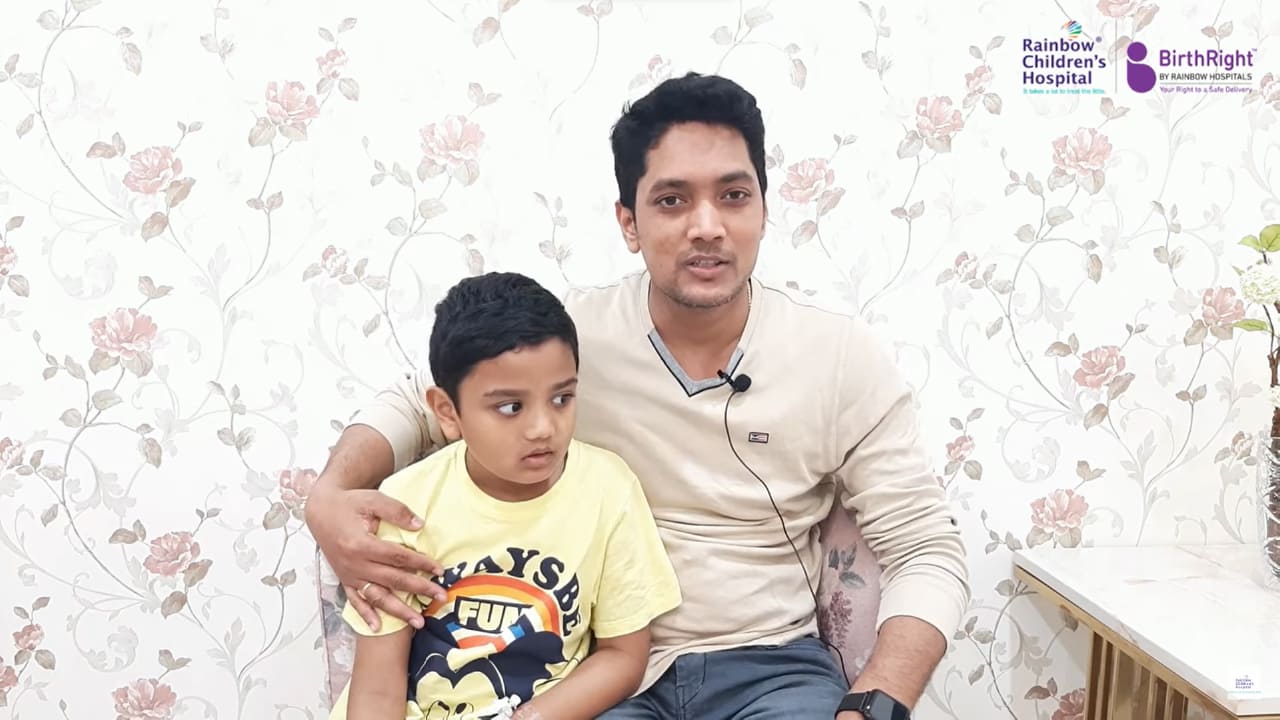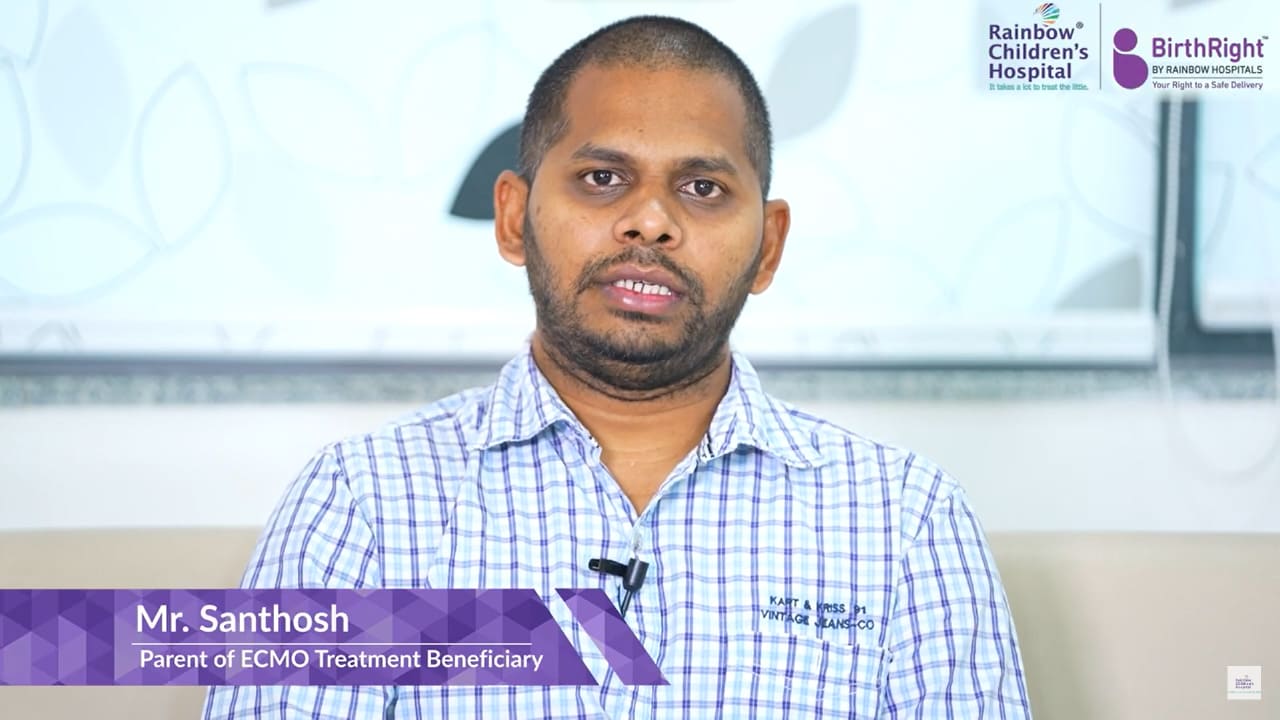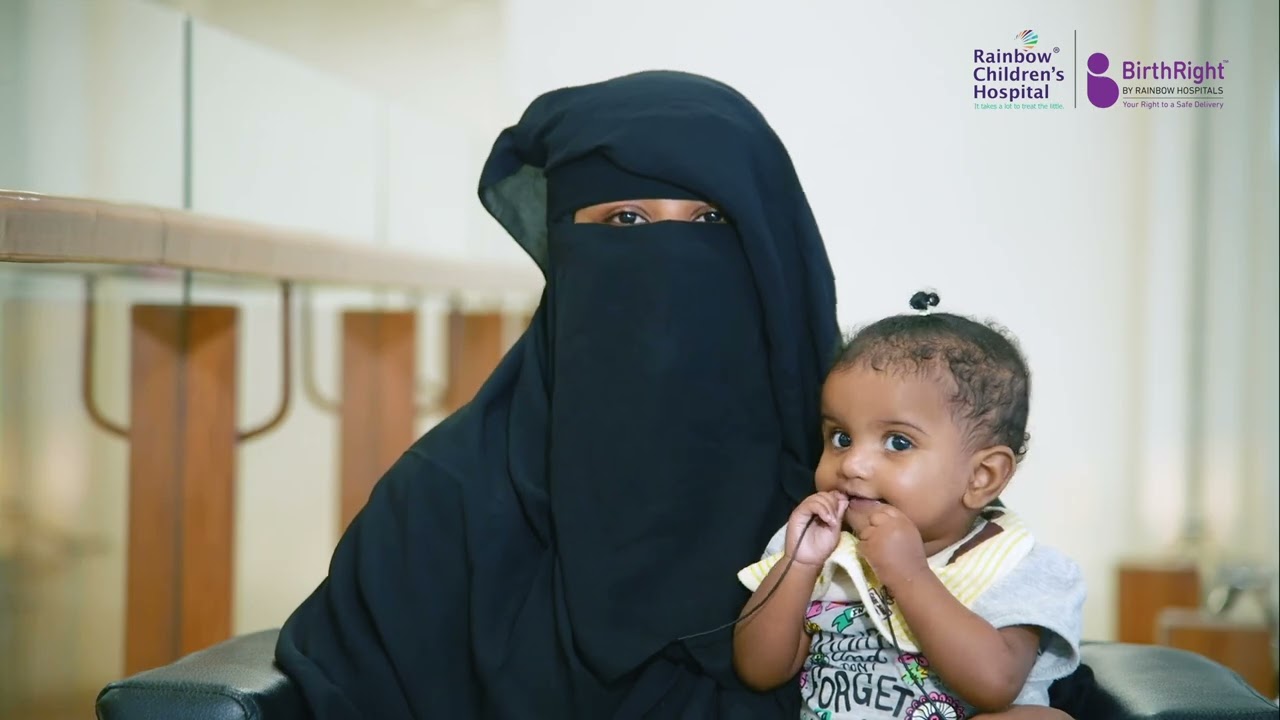Seamless support from diagnosis to post treatment care
Pediatric Gastroenterology & Liver Disease
Pediatric liver ailments in children have emerged as a burgeoning concern, carrying significant ramifications. Numerous liver disorders in the pediatric population, including conditions like cirrhosis and hepatocellular carcinoma, serve as precursors to chronic hepatopathies that persist into adulthood. Inherited hepatitis conditions, such as chronic hepatitis C, autoimmune hepatitis, and genetic disorders like hemochromatosis or cystic fibrosis, are among the diverse array of inherited hepatic disorders frequently encountered in the pediatric realm.
Rainbow Children's Hospital's Pediatric Liver Transplant program has undertaken more than 200 liver transplant procedures, demonstrating a commendable survival rate exceeding 90%. Their proficiency extends to the management of the most intricate liver transplant cases, bolstered by the advanced Neonatal Intensive Care Unit (NICU) and Pediatric Intensive Care Unit (PICU) teams. These teams have achieved notable success in executing a substantial volume of liver transplants, encompassing cadaveric auxiliary transplants and mono-segment transplants. Furthermore, they possess the requisite expertise, competence, and resources to undertake multifaceted transplants, including the simultaneous transplantation of both kidneys and the liver.
..
Find a Doctor
Expertise you can trust, Meet our esteemed doctors who bring exceptional knowledge, compassion, and innovation to provide top-notch care for your health and well-being.
Our Hospitals and ClinicsOur Hospitals and Clinics
Rainbow Children's Hospital stands as a testament to the hospital's continual pursuit of excellence and innovation, providing specialized care for women and children.
Request a Call back
Tap to Fill FormRequest a Call back
Blogs
Discover our most recent health articles provided by our reliable experts.
What Are People Saying About Us
Embark on a journey of inspiration and hope with our patient success stories, complemented by informative videos from our dedicated doctors.
During these initial visits, a dietitian can be consulted as well. In the second visit, the doctor will discuss the results of the test and tell you about your child’s condition. In some cases, further testing can be required. Depending on your child’s conditions, regular follow-up visits will be sent up.
Consultation from surgical, medical, and support staff
Transplant surgeon
Transplant coordinator
Hepatologist
Nutritionist
Blood tests
Liver panel
Chemistry panel
Coagulation studies
Blood typing & antibody screen
Hematology group
Epstein-Barr virus
Infectious diseases like HIV, cytomegalovirus, and hepatitis serologies
Imaging and other tests
Liver biopsy
Liver ultrasound
Developmental and psychosocial evaluations
Child development expert
Social worker
To prevent rejection of the transplanted liver, your child will be given immunosuppressive drugs. A liver biopsy might be performed to look for any rejection signs. Adding or increasing immunosuppressive drugs can be used for managing the rejection. Because of these drugs, your child will be exposed to viral and bacterial diseases. Therefore, it is important that your child is monitored for any signs and symptoms of infection.
The doctors and nurses will also keep checking for any potential postoperative complications like bleeding. In some cases, the pediatric patient will be taken back to the operating room for evaluating and treating the postoperative complication.
Bleeding
Blood clotting problems
Malfunction of the new liver
Respiratory problems
Infection
Rejection (the donor’s liver is rejected by the immune system of the body.
It is important to know that most of the above-mentioned complications are treatable.
Avoiding exposure to people with an infection
Staying on prescribed medication
Eating a balanced diet.
Following this will allow your child to attend school and participate in all age-appropriate activities, and have a normal life.
Quick Links
- Pediatric Gastroenterologist In Hyderabad
- Pediatric Gastroenterologist In Bangalore
- Pediatric Gastroenterologist In Delhi
- Pediatric Gastroenterologist In Chennai
- Pediatric Gastroenterologist In Vizag
- Pediatric Gastroenterologist In Marathahalli
- Pediatric Gastroenterologist In Bannerghatta
- Pediatric Gastroenterologist In Malviya Nagar
- Best Pediatric Gastroenterologist In Currency Nagar
- Best Pediatric Gastroenterologist In Banjara Hills
- Top Pediatric Gastroenterologist in India
- Best Pediatric Gastroenterologist In India
- Famous Pediatric Gastroenterologist In India
- Top Pediatric Gastroenterologist In India
- Famous Pediatric Gastroenterologist In India
- Best Pediatric Gastroenterologist In India
- Pediatric Gastroenterologist In India
- Gastroenterologist near me in Banjarahills
- Best Treatment for Jaundice in Children, Hyderabad
- Best Treatment for Endoscopy in Children, Hyderabad
- Best Treatment for Constipation in Children, Hyderabad
- Best Treatment for Crohn's Disease in Children, Hyderabad
- Best Treatment for Pancreatitis in Children, Hyderabad
- Best Treatment for Celiac Disease in Children, Hyderabad
- Best Treatment for Irritable Bowel Syndrome in Children, Hyderabad
- Best Treatment for Ulcerative Colitis in Children, Hyderabad
- Best Treatment for Helicobacter Pylori in Children, Hyderabad
- Best Treatment for Gallstones in Children, Hyderabad
- Best Treatment for Hirschsprung's Disease in Children, Hyderabad
- Best Treatment for Barrett's Esophagus in Children, Hyderabad
- Best Treatment for Polypectomy in Children, Hyderabad
- Best Treatment for Autoimmune Hepatitis in Children, Hyderabad
- Best Treatment for Carcinoid Tumors in Children, Hyderabad
- Best Treatment for Encopresis in Children, Hyderabad
- Best Treatment for Alagille Syndrome in Children, Hyderabad
- Best Treatment for Esophageal Strictures in Children, Hyderabad
- Best Treatment for ERCP Test in Children, Hyderabad
- Best Treatment for Anorectal Manometry in Children, Hyderabad
- Best Treatment for Stomach pain in Children, Hyderabad in Children, Hyderabad
- Best Treatment for Iron Chelation in Children, Hyderabad
- Best Treatment for Abdominal Pain in Children, Hyderabad in Children, Hyderabad
- Best Treatment for Pilonidal Disease in Children, Hyderabad
- Best Treatment for Gastric Emptying Study in Children, Hyderabad
- Best Treatment for Polypectomy Procedure in Children, Hyderabad
- Best Treatment for EndoFLIP in Children, Hyderabad
- Best Treatment for Esophagitis in Children, Hyderabad
- Best Treatment for Gastroesophageal Reflux Disease in Children, Hyderabad
- Best Treatment for Gastroparesis in Children, Hyderabad
- Best Treatment for Stomach and Duodenal Ulcers in Children, Hyderabad
- Best Treatment for Aspiration in Children, Hyderabad
- Best Treatment for Complete Tracheal Rings in Children, Hyderabad
- Best Treatment for Eosinophilic Gastrointestinal Disorders in Children, Hyderabad
- Best Treatment for Jaundice in Children, Bengaluru
- Best Treatment for Endoscopy in Children, Bengaluru
- Best Treatment for Constipation in Children, Bengaluru
- Best Treatment for Crohn's Disease in Children, Bengaluru
- Best Treatment for Pancreatitis in Children, Bengaluru
- Best Treatment for Celiac Disease in Children, Bengaluru
- Best Treatment for Irritable Bowel Syndrome in Children, Bengaluru
- Best Treatment for Ulcerative Colitis in Children, Bengaluru
- Best Treatment for Helicobacter Pylori in Children, Bengaluru
- Best Treatment for Gallstones in Children, Bengaluru
- Best Treatment for Hirschsprung's Disease in Children, Bengaluru
- Best Treatment for Barrett's Esophagus in Children, Bengaluru
- Best Treatment for Polypectomy in Children, Bengaluru
- Best Treatment for Autoimmune Hepatitis in Children, Bengaluru
- Best Treatment for Carcinoid Tumors in Children, Bengaluru
- Best Treatment for Encopresis in Children, Bengaluru
- Best Treatment for Alagille Syndrome in Children, Bengaluru
- Best Treatment for Esophageal Strictures in Children, Bengaluru
- Best Treatment for ERCP Test in Children, Bengaluru
- Best Treatment for Anorectal Manometry in Children, Bengaluru
- Best Treatment for Stomach pain in Children, Bengaluru
- Best Treatment for Iron Chelation in Children, Bengaluru
- Best Treatment for Abdominal Pain in Children, Bengaluru
- Best Treatment for Pilonidal Disease in Children, Bengaluru
- Best Treatment for Gastric Emptying Study in Children, Bengaluru
- Best Treatment for Polypectomy Procedure in Children, Bengaluru
- Best Treatment for EndoFLIP in Children, Bengaluru
- Best Treatment for Esophagitis in Children, Bengaluru
- Best Treatment for Gastroesophageal Reflux Disease in Children, Bengaluru
- Best Treatment for Gastroparesis in Children, Bengaluru
- Best Treatment for Stomach and Duodenal Ulcers in Children, Bengaluru
- Best Treatment for Aspiration in Children, Bengaluru
- Best Treatment for Cirrhosis in Children, Bengaluru
- Best Treatment for Eosinophilic Gastrointestinal Disorders in Children, Bengaluru
- Best Treatment for Jaundice in Children, Delhi
- Best Treatment for Endoscopy in Children, Delhi
- Best Treatment for Constipation in Children, Delhi
- Best Treatment for Crohn's Disease in Children, Delhi
- Best Treatment for Pancreatitis in Children, Delhi
- Best Treatment for Celiac Disease in Children, Delhi
- Best Treatment for Irritable Bowel Syndrome in Children, Delhi
- Best Treatment for Ulcerative Colitis in Children, Delhi
- Best Treatment for Helicobacter Pylori in Children, Delhi
- Best Treatment for Gallstones in Children, Delhi
- Best Treatment for Hirschsprung's Disease in Children, Delhi
- Best Treatment for Barrett's Esophagus in Children, Delhi
- Best Treatment for Polypectomy in Children, Delhi
- Best Treatment for Autoimmune Hepatitis in Children, Delhi
- Best Treatment for Carcinoid Tumors in Children, Delhi
- Best Treatment for Encopresis in Children, Delhi
- Best Treatment for Alagille Syndrome in Children, Delhi
- Best Treatment for Esophageal Strictures in Children, Delhi
- Best Treatment for ERCP Test in Children, Delhi
- Best Treatment for Anorectal Manometry in Children, Delhi
- Best Treatment for Stomach pain in Children, Delhi
- Best Treatment for Iron Chelation in Children, Delhi
- Best Treatment for Abdominal Pain in Children, Delhi
- Best Treatment for Pilonidal Disease in Children, Delhi
- Gastric Emptying Study in Children, Delhi
- Polypectomy Procedure in Children, Delhi
- EndoFLIP in Children, Delhi
- Esophagitis in Children, Delhi in Children, Delhi
- Gastroesophageal Reflux Disease in Children, Delhi in Children, Delhi
- Gastroparesis in Children, Delhi in Children, Delhi
- Stomach and Duodenal Ulcers in Children, Delhi
- Aspiration in Children, Delhi in Children, Delhi
- Cirrhosis in Children, Delhi in Children, Delhi
- Eosinophilic Gastrointestinal Disorders in Children, Delhi
- Jaundice in Children, Chennai
- Endoscopy in Children, Chennai
- Constipation in Children, Chennai
- Crohn's Disease in Children, Chennai
- Pancreatitis in Children, Chennai
- Celiac Disease in Children, Chennai
- Irritable Bowel Syndrome in Children, Chennai
- Ulcerative Colitis in Children, Chennai
- Helicobacter Pylori in Children, Chennai
- Gallstones in Children, Chennai
- Hirschsprung's Disease in Children, Chennai
- Barrett's Esophagus in Children, Chennai
- Polypectomy in Children, Chennai
- Autoimmune Hepatitis in Children, Chennai
- Carcinoid Tumors in Children, Chennai
- Encopresis in Children, Chennai
- Alagille Syndrome in Children, Chennai
- Esophageal Strictures in Children, Chennai
- ERCP Test in Children, Chennai
- Anorectal Manometry in Children, Chennai
- Stomach pain in Children, Chennai in Children, Chennai
- Iron Chelation in Children, Chennai
- Abdominal Pain in Children, Chennai in Children, Chennai
- Pilonidal Disease in Children, Chennai
- Gastric Emptying Study in Children, Chennai
- Polypectomy Procedure in Children, Chennai
- Best Treatment for EndoFLIP in Children, Chennai
- Best Treatment for Esophagitis in Children, Chennai
- Best Treatment for Gastroesophageal Reflux Disease in Children, Chennai
- Best Treatment for Gastroparesis in Children, Chennai
- Best Treatment for Stomach and Duodenal Ulcers in Children, Chennai
- Best Treatment for Aspiration in Children, Chennai
- Best Treatment for Cirrhosis in Children, Chennai
- Eosinophilic Gastrointestinal Disorders in Children, Chennai
- Best Treatment for Jaundice in Children, Vijayawada
- Best Treatment for Endoscopy in Children, Vijayawada
- Best Treatment for Constipation in Children, Vijayawada
- Best Treatment for Crohn's Disease in Children, Vijayawada
- Best Treatment for Pancreatitis in Children, Vijayawada
- Best Treatment for Celiac Disease in Children, Vijayawada
- Best Treatment for Irritable Bowel Syndrome in Children, Vijayawada
- Ulcerative Colitis in Children, Vijayawada
- Best Treatment for Helicobacter Pylori in Children, Vijayawada
- Best Treatment for Gallstones in Children, Vijayawada
- Best Treatment for Hirschsprung's Disease in Children, Vijayawada
- Best Treatment for Barrett's Esophagus in Children, Vijayawada
- Best Treatment for Polypectomy in Children, Vijayawada
- Best Treatment for Autoimmune Hepatitis in Children, Vijayawada
- Best Treatment for Carcinoid Tumors in Children, Vijayawada
- Best Treatment for Encopresis in Children, Vijayawada
- Best Treatment for Alagille Syndrome in Children, Vijayawada
- Best Treatment for Esophageal Strictures in Children, Vijayawada
- Best Treatment for ERCP Test in Children, Vijayawada
- Best Treatment for Anorectal Manometry in Children, Vijayawada
- Best Treatment for Stomach pain in Children, Vijayawada
- Best Treatment for Iron Chelation in Children, Vijayawada
- Best Treatment for Abdominal Pain in Children, Vijayawada in Children, Vijayawada
- Best Treatment for Pilonidal Disease in Children, Vijayawada
- Best Treatment for Gastric Emptying Study in Children, Vijayawada
- Best Treatment for Polypectomy Procedure in Children, Vijayawada
- Best Treatment for EndoFLIP in Children, Vijayawada
- Best Treatment for Esophagitis in Children, Vijayawada
- Best Treatment for Gastroesophageal Reflux Disease in Children, Vijayawada
- Best Treatment for Gastroparesis in Children, Vijayawada
- Best Treatment for Stomach and Duodenal Ulcers in Children, Vijayawada
- Best Treatment for Aspiration in Children, Vijayawada
- Best Treatment for Cirrhosis in Children, Vijayawada
- Best Treatment for Eosinophilic Gastrointestinal Disorders in Children, Vijayawada
- Best Treatment For Jaundice in Children, Vizag
- Best Treatment For Endoscopy in Children, Vizag
- Best Treatment For Constipation in Children, Vizag
- Best Treatment For Crohn's Disease in Children, Vizag
- Best Treatment For Pancreatitis in Children, Vizag
- celiac-disease-in-children-vizag
- Best Treatment For Irritable Bowel Syndrome in Children, Vizag
- Best Treatment For Ulcerative Colitis in Children, Vizag
- Best Treatment For Helicobacter Pylori in Children, Vizag
- Best Treatment For Gallstones in Children, Vizag
- Best Treatment For Hirschsprung's Disease in Children, Vizag
- Best Treatment For Barrett's Esophagus in Children, Vizag
- Best treatment For Polypectomy in Children, Vizag
- Best treatment For Autoimmune Hepatitis in Children, Vizag
- Best treatment For Carcinoid Tumors in Children, Vizag
- Best treatment For Encopresis in Children, Vizag
- Best Treatment For Alagille Syndrome in Children, Vizag
- Best Treatment For Esophageal Strictures in Children, Vizag
- Best Treatment For ERCP Test in Children, Vizag
- Best Treatment For Anorectal Manometry in Children, Vizag
- Best Treatment For Stomach pain in Children, Vizag in Children, Vizag
- Best Treatment For Iron Chelation in Children, Vizag
- Best Treatment For Abdominal Pain in Children, Vizag
- Best Pediatric Gastroenterology & Liver Disease in Sarjapur Road, Bengaluru
- Best Pediatric Gastroenterology & Liver Disease in Himayatnagar, Hyderabad
- Best Pediatric Gastroenterology & Liver Disease in Anna Nagar, Chennai
- Best Pediatric Gastroenterology & Hepatalogy in Anna Nagar, Chennai
- Best jaundice treatment in Bangalore
- Best jaundice treatment in Chennai
- Best Jaundice treatment in Hyderabad
- Best Gastroenterologist near me in Bangalore
- Best Gastroenterologist near me in Chennai
- Best Gastroenterologist near me in Hyderabad
- Best Pediatric Gastro Doctor near me, Anna Nagar
- Best Pediatric Gastro Hospital in Anna Nagar
- Best Gastroenterologist in Anna Nagar
- Best Gastroenterologist Near Anna Nagar
- Best Gastroenterologist near me, Anna Nagar
- Best Gastroenterology doctors near me, Anna Nagar
- Best Gastrologist near me, Anna Nagar
- Best Jaundice treatment in Anna Nagar













